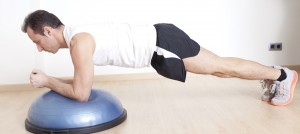 There are many myths and misconceptions about ‘core stability’ which has become a popular concept in both the rehabilitation and fitness industries in recent years. Physiotherapists are seeing an increasing number of people who have fallen victim to an often misguided approach and undertaken exercise regimes that have led to back pain and/or related hip and leg problems which can be linked to improperly ’training their core’.
There are many myths and misconceptions about ‘core stability’ which has become a popular concept in both the rehabilitation and fitness industries in recent years. Physiotherapists are seeing an increasing number of people who have fallen victim to an often misguided approach and undertaken exercise regimes that have led to back pain and/or related hip and leg problems which can be linked to improperly ’training their core’.
Why over-training your core can be harmful
‘Core stability training’ has often become mistakenly synonymous with ‘strengthening your abs’ (abdominal muscles). Unfortunately the real implications of research have often been misunderstood and many of the ‘core muscle training’ programmes offered within the gym and fitness industry are poorly conceived and delivered, frequently adopting directives such as ‘suck the stomach in” – with the emphasis on ‘pulling in’, ‘holding’ and curling the spine forward.
Overworking the abdominal muscles can create too much tightness around the centre of the body which can adversely affect important aspects of our body, for example, altered spinal posture and difficulty effectively controlling movements of the trunk, can lead to:
- Increasing incidence of low back pain and allied disorders
- Unhelpful and unsupportive breathing patterns
- Neck and shoulder tension and pain
- Stress urinary incontinence
The core muscles do not only consist of the abdominal musculature, but also consists of the trunk muscles, pelvic muscles and quite importantly the muscles of the hips and shoulders.
Improved control of the ‘core’ enables the pelvis and base of the spine to better support posture and movements of the whole spinal column. Core control is also fundamental in being able to develop functional strength as well as the ability to stretch more effectively and safely without reinforcing unhealthy stresses on the spine.
A strong core can lead to the improvement of everyday life, injury prevention, chronic back pain reduction, and enhanced sports performance.
If you are suffering from any upper and lower limb injury as well as pain in the spine, your functional core stability needs to be assessed and an appropriate rehabilitation program will be set. This will be very individual to you and will work with your lifestyle, whether your problem is doing the house work or if you are an elite athlete.







To request an appointment, please click the Request Appointment button at the top of the page.